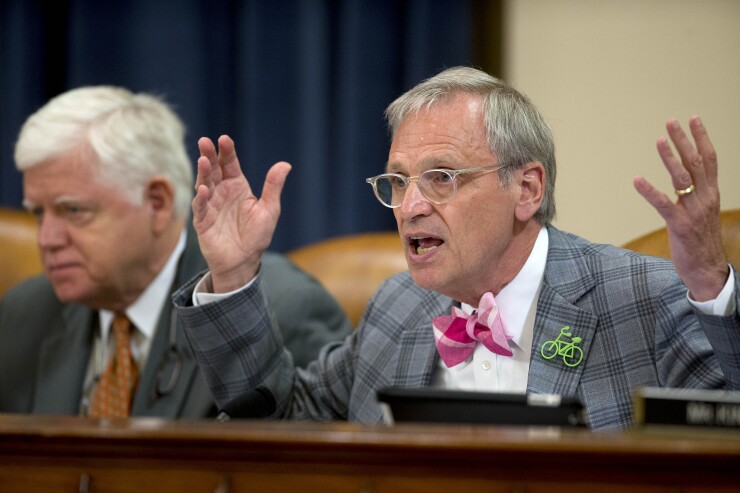WASHINGTON – A bipartisan House version of a Senate proposal to expand tax-exempt private activity bonds with the creation of Move America Bonds was introduced Tuesday on the eve of hearings that will ramp up long-awaited congressional work on infrastructure legislation.
Rep. Earl Blumenauer, D-Ore., is cosponsoring the bill with fellow Ways and Means Committee member Rep. Jackie Walorsky, R-Ind.

A wide variety of projects would be eligible, including airports, ports, transit, freight and passenger rail, roads, bridges, flood projects, inland and coastal waterway improvements, wastewater and sewage facilities, and broadband infrastructure.
The bill also would establish a new federal infrastructure tax credit to encourage public-private partnerships.
The legislation would leverage $8 billion in federal investment into $226 billion worth of bond authority over the next 10 years or up to $56 billion over 10 years in tax credits, according an estimate by the nonpartisan congressional Joint Committee on Taxation.
The Senate version of the bill (S.146) was reintroduced in January by Sens. John Hoeven, R-N.D., and Ron Wyden, D-Ore., after languishing in the two previous Congresses dating back to May 2015.
House Democrats have tentatively scheduled floor time in late spring for consideration of major infrastructure legislation that two key committees will formulate in the coming weeks, Blumenauer told reporters at a briefing Tuesday.
Blumenauer, who held the briefing prior to announcing his sponsorship of the Move America Act, said Democrats are not sponsoring a large number of infrastructure bills that will compete with each other and prefer to achieve their goals in a more consolidated way.
The Ways and Means Committee has jurisdiction over tax policy, which also includes authorization for PABs and advance refundings.
The other major committee involved is the Transportation and Infrastructure Committee which has jurisdiction over transportation fees such as the federal gasoline tax, the passenger facility fee charged by airports and the Harbor Maintenance Trust Fund.
Blumenauer said Democrats are unlikely at add “unnecessary complexity” to any infrastructure pay-fors by trying to roll back parts of the 2017 Tax Cuts and Jobs Act enacted by Republicans because House Democrats want the legislation to be bipartisan.
“I think there’s an opportunity for us to reach at least some sort of a consensus and with the president staking out the $1 trillion or $2 trillion number can give cover to some people," he said. "And if this starts moving, we will add definition to the administration’s position which has been hard to pin down.”
He also downplayed the possible role of P3s in the larger infrastructure legislation. “There is a role for public private partnerships, but the evidence is that’s only 2% or 3% of the projects,” Blumenauer said, noting that they don’t usually work in rural or small town areas.
He hopes the lawmakers also look at creating a national infrastructure bank. “And we ought to be open to creative ideas from people on both sides of the aisle, and most importantly, from the public,” he said.
Blumenauer said he remains optimistic Congress can enact infrastructure legislation this year. “I’m convinced that this Congress can break this stalemate,” he said.
“We have a little bit of a problem in that we lost six weeks with a sad and unnecessary shutdown that frayed some nerves and made it a little harder for some people to talk and work together,” Blumenauer said.
Local stakeholders such a mayors, contractors, truckers and transit agency offer their perspective need to voice their perspective to local congressmen, he said.
“I think the time frame is the next 100 days," Blumenauer said. "I think that’s the time to move out and have these conversations."





